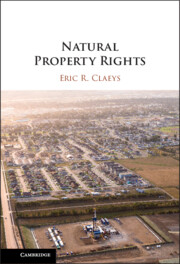Book contents
- Natural Property Rights
- Natural Property Rights
- Copyright page
- Contents
- Acknowledgments
- Note on Cover
- Table of Cases
- Table of Legislative Materials
- Table of Multiple Edition Works
- Part I Foundations
- Part II The Natural Right to Property
- Part III Property Law
- 8 Justifying Ownership
- 9 Limiting Ownership
- 10 Designing Property Rights
- 11 Subdividing Ownership Rights
- Part IV Property in Common Law and Public Law
- Index
- References
11 - Subdividing Ownership Rights
from Part III - Property Law
Published online by Cambridge University Press: 17 April 2025
- Natural Property Rights
- Natural Property Rights
- Copyright page
- Contents
- Acknowledgments
- Note on Cover
- Table of Cases
- Table of Legislative Materials
- Table of Multiple Edition Works
- Part I Foundations
- Part II The Natural Right to Property
- Part III Property Law
- 8 Justifying Ownership
- 9 Limiting Ownership
- 10 Designing Property Rights
- 11 Subdividing Ownership Rights
- Part IV Property in Common Law and Public Law
- Index
- References
Summary
Ownership entitles owners to assign away some lesser property rights and retain other such rights. This chapter studies the cases for and against these lesser rights, called in this chapter “component” rights. Component rights may and should be limited when they help owners and the likely assignees of component rights use the resources more productively. The rights may and should be limited when they interfere with the clarity of property rights and when they interfere with opportunities of people who are not assignees to have sufficient access to resources. Property’s productive use requirement also justifies correlative doctrines between people who hold component rights in the same resource. This chapter studies leases, servitudes, security interests, present possessory estates, and future interests. To study limits on component rights, this chapter studies formalities requirements, standard terms of art for different component rights, the numerus clausus principle, the Rule Against Perpetuities, and the doctrine terminating servitudes for changed conditions. To study correlative rights, this chapter studies the doctrine of ameliorative waste.
Keywords
- Type
- Chapter
- Information
- Natural Property Rights , pp. 201 - 218Publisher: Cambridge University PressPrint publication year: 2025

